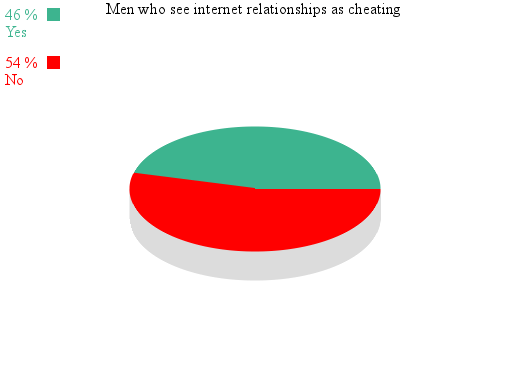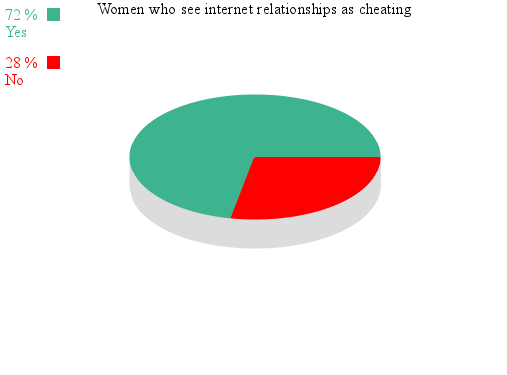Online cheating is the act of engaging in a virtual affair, which doesn’t necessarily involve a physical affair, but may include sexting, exchanging photos via email, or heavy flirtation. These are difficult situations to assess and handle because without the physical act of cheating, your significant other may not think what they are doing constitutes as “cheating.” Here are some signs you can look out for and some tips on how to catch a cheater.
First, Let’s Define Online Cheating
 As sex educator, researcher, and therapist Laura Berman, PhD explains on Everyday Health, “Sexual infidelity means you need to have sexual contact with a person who is not your partner, and emotional infidelity means that you’re confiding in and emotionally connecting with a person outside of your relationship without the sex. We’re dealing with a whole new category here!”
As sex educator, researcher, and therapist Laura Berman, PhD explains on Everyday Health, “Sexual infidelity means you need to have sexual contact with a person who is not your partner, and emotional infidelity means that you’re confiding in and emotionally connecting with a person outside of your relationship without the sex. We’re dealing with a whole new category here!”
This makes it more confusing than ever to draw boundaries in a relationship to determine what does and what does not constitute appropriate online behavior for a married person.
Suspicious Internet Behavior
If your partner is exhibiting suspicious internet behavior such as quickly minimizing windows when you walk into the room, being overly secretive about social media accounts, email, or phone activity, clearing out the browser history regularly, or adding passwords to accounts or password protecting devices that didn’t have passwords before, it may be time to have a discussion.
Spending Off-Work Time Hours on the Computer and Answering Texts Immediately
Occasionally work has to come home and as an adult, you should be able to understand that work responsibilities can bleed into personal life, but if you significant other is spending regular work hours on the computer rather than with you and is answering text messages immediately and almost compulsively, this could be a sign of foul play.
Secret Accounts
There is no reason your significant other should have a social media account or email that they keep secret from you. They may have multiple accounts for business and personal reasons, but secret online profiles or refusing to be “friends” with you online is hardly a good sign.
Monthly Phone Bill
If your monthly phone bill seems higher than normal, especially due to texting and if there are repeated numbers being contacted, it’s time to have an honest conversation about who they are constantly contacting.
As stated by Examiner.com, “ According to statistics, 50% of people who engage in internet chats have made phone contact with someone they chatted with online… One study found that 30 % of cyber-affairs escalate from e-mail to telephone calls to personal contact.”
Have An Honest Conversation
If you are worried that your partner is engaging in inappropriate online behavior behind your back, the best thing you can do is calmly approach them for a face-to-face adult conversation. Explain how their behavior makes you feel and explain specifically that certain behaviors are not appropriate for someone who is in a committed relationship. You may not both agree on what about the behavior constitutes as cheating, but it’s important that you both understand where you are each coming from. Perhaps the guilty partner honestly didn’t think their actions constituted as infidelity and they are truly sorry and won’t do it again. As stated by Examiner.com, “A survey in Divorce Magazine found that only 46 percent of men considered intense internet relationships to be infidelity, compared to 72 percent of women.” Perhaps you decide that this does mean that you will have to terminate the relationship. Either way, discuss the situation as adults and make sure both of you understand the outcome of the situation.
According to a recent survey by the American Academy of Matrimonial Lawyers, 81% of divorce lawyers say they have seen an increase in evidence of behavior on social networking in the last five years (Facebook being the primary source of evidence used by two-thirds of divorce attorneys).
But sneaking around to spy on your partner or catch them in the act is doing nothing to help the situation. If you suspect them of online cheating, the best way is to be open and honest about your suspicions and hope that they will be open and honest back.
Seek Professional Help
If you are both willing to move on and put the infidelity behind you, enlisting the help of a relationship therapist can be hugely beneficial to help rebuild trust in your relationship and solidify the values that can make blurred lines of online conduct more clear.
Have you ever caught your partner online cheating? What did you do and how did you know? Share you experiences in the comments section below.





